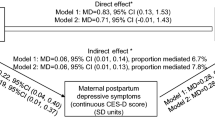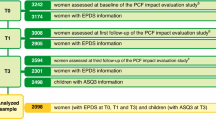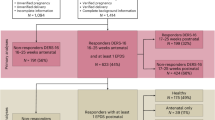Abstract
Background
Evidence on the association between perinatal maternal depression and children’s behavioral development is limited. We investigated the association between maternal depressive symptoms during pregnancy and postpartum and the risk of childhood behavioral problems using data from a birth cohort study.
Methods
Study subjects were 1199 mother–child pairs. Maternal depressive symptoms were assessed with the Center for Epidemiologic Studies Depression Scale during pregnancy and the Edinburgh Postnatal Depression Scale at 4 months postpartum. Children’s behavioral development at 5 years of age was assessed with the Strengths and Difficulties Questionnaire.
Results
Compared with children whose mothers did not experience depressive symptoms during pregnancy, those whose mothers did experience depressive symptoms during pregnancy had increased risk of emotional symptoms, conduct problems, hyperactivity, peer problems, and low prosocial behavior. Maternal depressive symptoms at around 4 months postpartum were associated with increased risk of childhood emotional problems. Compared with children whose mothers did not experience depressive symptoms during the perinatal period, those whose mothers did experience depressive symptoms both during pregnancy and postpartum had a fivefold increased risk of childhood emotional symptoms and a threefold increased risk of peer problems.
Conclusions
Our findings suggest that perinatal maternal depression is associated with behavioral problems in children.
Impact
-
Several epidemiological studies in Western countries have examined the association between perinatal maternal depression and children’s behavioral development, yet the results are conflicting and inconclusive.
-
There is limited evidence on this topic in Asia.
-
In our study using data from a prospective pregnancy birth cohort, maternal depressive symptoms around 4 months postpartum were associated with an increased risk of emotional symptoms in children aged 5 years.
-
Children whose mothers had exhibited depressive symptoms both during pregnancy and postpartum had a fivefold increased risk of childhood emotional symptoms and a threefold increased risk of peer problems.
Similar content being viewed by others
Log in or create a free account to read this content
Gain free access to this article, as well as selected content from this journal and more on nature.com
or
References
Arifin, S. R. M., Cheyne, H. & Maxwell, M. Review of the prevalence of postnatal depression across cultures. AIMS Public Health 5, 260–295 (2018).
Barker, D. J. Fetal origins of coronary heart disease. BMJ 311, 171–174 (1995).
Tanaka, K., Miyake, Y., Furukawa, S. & Arakawa, M. Perinatal smoking exposure and behavioral problems in Japanese children aged 5 years: The Kyushu Okinawa Maternal and Child Health Study. Environ. Res. 151, 383–388 (2016).
O’Connor, T. G., Heron, J., Golding, J., Glover, V. & ALSPAC Study Team. Maternal antenatal anxiety and behavioural/emotional problems in children: a test of a programming hypothesis. J. Child Psychol. Psychiatry 44, 1025–1036 (2003).
Goodman, S. H. et al. Maternal depression and child psychopathology: a meta-analytic review. Clin. Child Fam. Psychol. Rev. 14, 1–27 (2011).
Beck, C. T. Maternal depression and child behaviour problems: a meta-analysis. J. Adv. Nurs. 29, 623–629 (1999).
Talge, N. M., Neal, C., Glover, V. & Early Stress, Translational Research and Prevention Science Network: Fetal and Neonatal Experience on Child and Adolescent Mental Health. Antenatal maternal stress and long-term effects on child neurodevelopment: how and why? J. Child Psychol. Psychiatry 48, 245–261 (2007).
Kingston, D. et al. Trajectories of maternal depressive symptoms during pregnancy and the first 12 months postpartum and child externalizing and internalizing behavior at three years. PLoS ONE 13, e0195365 (2018).
Fransson, E. et al. Maternal perinatal depressive symptoms trajectories and impact on toddler behavior—the importance of symptom duration and maternal bonding. J. Affect. Disord. 273, 542–551 (2020).
Van Batenburg-Eddes, T. et al. Parental depressive and anxiety symptoms during pregnancy and attention problems in children: a cross-cohort consistency study. J. Child Psychol. Psychiatry 54, 591–600 (2013).
Vafai, Y., Steinberg, J. R. & Shenassa, E. D. Maternal postpartum depressive symptoms and infant externalizing and internalizing behaviors. Infant Behav. Dev. 42, 119–127 (2016).
Nadeem, S., Rafique, G. & Chachar, Y. S. Maternal depression: a major risk factor for psychosocial wellbeing among preschoolers. Asian J. Psychiatr. 37, 85–89 (2018).
Roomruangwong, C. & Epperson, C. N. Perinatal depression in Asian women: prevalence, associated factors, and cultural aspects. Asian Biomed. 5, 179–193 (2011).
Takegata, M., Ohashi, Y., Lazarus, A. & Kitamura, T. Cross-national differences in psychosocial factors of perinatal depression: a systematic review of India and Japan. Healthcare (Basel) 5, 91 (2017).
Miyake, Y., Tanaka, K., Okubo, H., Sasaki, S. & Arakawa, M. Fish and fat intake and prevalence of depressive symptoms during pregnancy in Japan: baseline data from the Kyushu Okinawa Maternal and Child Health Study. J. Psychiatr. Res. 47, 572–578 (2013).
Shima, S., Shikano, T., Kitamura, T. & Asaim, M. New self-rated scale for depression (in Japanese). Jpn J. Clin. Psychiatry 27, 717–723 (1985).
Radloff, L. S. The CES-D scale: a self-report depression scale for research in the general population. Appl Psychol. Meas. 1, 385–401 (1977).
Cox, J. L., Holden, J. M. & Sagovsky, R. Detection of postnatal depression. Development of the 10-item Edinburgh Postnatal Depression Scale. Br. J. Psychiatry 150, 782–786 (1987).
Okano, T. et al. Validation and reliability of Japanese version of the EPDS (in Japanese). Arch. Psychiatr. Diagn. Clin. Eval. 7, 525–533 (1996).
Goodman, R. The Strengths and Difficulties Questionnaire: a research note. J. Child Psychol. Psychiatry 38, 581–586 (1997).
Matsuishi, T. et al. Scale properties of the Japanese version of the Strengths and Difficulties Questionnaire (SDQ): a study of infant and school children in community samples. Brain Dev. 30, 410–415 (2008).
Sasaki, S., Yanagibori, R. & Amano, K. Self-administered diet history questionnaire developed for health education: a relative validation of the test-version by comparison with 3-day diet record in women. J. Epidemiol. 8, 203–215 (1998).
Sasaki, S. et al. Serum biomarker-based validation of a self-administered diet history questionnaire for Japanese subjects. J. Nutr. Sci. Vitaminol. (Tokyo) 46, 285–296 (2000).
Koutra, K. et al. Maternal depression and personality traits in association with child neuropsychological and behavioral development in preschool years: mother-child cohort (Rhea Study) in Crete, Greece. J. Affect Disord. 217, 89–98 (2017).
van der Waerden, J. et al. Maternal depression trajectories and children’s behavior at age 5 years. J. Pediatr. 166, 1440–1448 (2015).
Giallo, R., Woolhouse, H., Gartland, D., Hiscock, H. & Brown, S. The emotional-behavioural functioning of children exposed to maternal depressive symptoms across pregnancy and early childhood: a prospective Australian pregnancy cohort study. Eur. Child Adolesc. Psychiatry 24, 1233–1244 (2015).
Cents, R. A. et al. Trajectories of maternal depressive symptoms predict child problem behaviour: the Generation R study. Psychol. Med. 43, 13–25 (2013).
Oppenheimer, C. W., Hankin, B. L., Young, J. F. & Smolen, A. Youth genetic vulnerability to maternal depressive symptoms: 5-HTTLPR as moderator of intergenerational transmission effects in a multiwave prospective study. Depress. Anxiety 30, 190–196 (2013).
McAdams, T. A. et al. The relationship between parental depressive symptoms and offspring psychopathology: evidence from a children-of-twins study and an adoption study. Psychol. Med. 45, 2583–2594 (2015).
Silberg, J. L., Maes, H. & Eaves, L. J. Genetic and environmental influences on the transmission of parental depression to children’s depression and conduct disturbance: an extended children of twins study. J. Child Psychol. Psychiatry 51, 734–744 (2010).
Statistics Bureau, Ministry of Public Management, Home Affairs, Posts and Telecommunications, 2002. 2000 Population Census of Japan, Vol. 3-2-40, Labour Force Status of Population, Industry (Major Groups) of Employed Persons, and Education, Fukuoka-ken. Statistics Bureau, Ministry of Public Management, Home Affairs, Posts and Telecommunications, Tokyo.
National Institute of Health and Nutrition, 2010. The National Health and Nutrition Survey Japan, 2007. Daiichi Shuppan, Tokyo.
Healthy Parents and Children 21. https://sukoyaka21.jp/healthy-parents-and-children-21 (2001).
Acknowledgements
The authors would like to thank the Kyushu Branch of the Japan Allergy Foundation, the Fukuoka Association of Obstetricians & Gynecologists, the Okinawa Association of Obstetricians & Gynecologists, the Miyazaki Association of Obstetricians & Gynecologists, the Oita Association of Obstetricians & Gynecologists, the Kumamoto Association of Obstetricians & Gynecologists, the Nagasaki Association of Obstetricians & Gynecologists, the Kagoshima Association of Obstetricians & Gynecologists, the Saga Association of Obstetricians & Gynecologists, the Fukuoka Society of Obstetrics and Gynecology, the Okinawa Society of Obstetrics and Gynecology, the Fukuoka City Government, and the Fukuoka City Medical Association for their valuable support. These organizations did not have any influence on the study design; the collection, analysis, or interpretation of data; the writing of the report; or the decision to submit the article for publication.
Funding
This study was supported by JSPS KAKENHI Grant Numbers 19590606, 20791654, 21590673, 22592355, 22119507, 24390158, 25463275, 25670305, 17K12011JP, 17H04135JP, and 21H03199JP and by Health and Labour Sciences Research Grants for Research on Allergic Disease and Immunology and Health Research on Children, Youth and Families from the Ministry of Health, Labour and Welfare, Japan.
Author information
Authors and Affiliations
Contributions
MY was responsible for the analysis and interpretation of data and the drafting of the manuscript. KT contributed to the study concept and design, the data acquisition, and was responsible for the analysis and interpretation of data and the drafting of the manuscript. YM contributed to the study concept and design, the data acquisition, and assisted in manuscript preparation. MA contributed to the study concept and design and the data acquisition. All authors read and approved the final manuscript.
Corresponding author
Ethics declarations
Competing interests
The authors declare no competing interests.
Consent statement
Mothers gave their written informed consent to participate in the Kyushu Okinawa Maternal and Child Health Study.
Additional information
Publisher’s note Springer Nature remains neutral with regard to jurisdictional claims in published maps and institutional affiliations.
Rights and permissions
About this article
Cite this article
Yamada, M., Tanaka, K., Arakawa, M. et al. Perinatal maternal depressive symptoms and risk of behavioral problems at five years. Pediatr Res 92, 315–321 (2022). https://doi.org/10.1038/s41390-021-01719-9
Received:
Revised:
Accepted:
Published:
Version of record:
Issue date:
DOI: https://doi.org/10.1038/s41390-021-01719-9
This article is cited by
-
Overreactive parenting links maternal depressive symptoms and child prosocial behaviors among mother-child dyads in Western China
BMC Public Health (2026)
-
Nonlinear associations between maternal depressive symptoms and children’s mental health: a cross-sectional study
BMC Psychology (2026)
-
Prenatal maternal stress: triangulating evidence for intrauterine exposure effects on birth and early childhood outcomes across multiple approaches
BMC Medicine (2025)
-
Perinatal maternal mental health and offspring internalizing and externalizing difficulties from early childhood through adolescence: Rhea mother—child cohort in Crete, Greece
European Child & Adolescent Psychiatry (2025)
-
Collaborative tailoring of the Reach Out, Stay Strong Essentials (ROSE) program for pregnant veterans in the U.S. Veterans Health Administration: a qualitative case study of contextual conditions and adaptations
BMC Health Services Research (2025)



